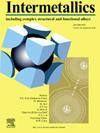Cu-bearing HHCCI interface combined with first principles calculation and corrosive wear resistance
IF 4.8
2区 材料科学
Q2 CHEMISTRY, PHYSICAL
引用次数: 0
Abstract
The corrosive wear resistance of copper-bearing HHCCI was tested through experiments and HRTEM, combined with first-principles calculations to study the atomic structure, interface fracture work, thermodynamic stability, electronic structure and bonding structure of six Fe3Cr4C3(01 0)/γ-Fe(101) interface models with different termination methods. The HRTEM results show that the interface formed by (01 0) of M7C3-type carbide and (101) of the austenite matrix is a coherent interface. The first principles calculation results show that the interface formed by the Fe3Cr4C3(01 0)-Cr termination model and the γ-Fe (101)-2 termination model has the highest interface bonding strength. The Fe-end/7Fe-2 interface model is the most stable. Both the interfacial chemical energy and the interfacial elastic energy will affect the overall thermodynamic stability of the Fe3Cr4C3(01 0)/γ-Fe (101) interface. The fracture work of Fe3Cr4C3(01 0) and γ-Fe (101) is greater than the corresponding interface adhesion work. Moreover, the fracture work on each terminal end of M7C3 along the (01 0) surface is higher than that on each terminal end of γ-Fe along the (101) surface. The failure of HHCCI during corrosive wear may mainly occur in the interface area or the side close to the γ-Fe matrix. The chemical bonds in the Fe-end/7Fe interface are mainly Fe-Fe metal bonds, Fe-Cr metal bonds and some Fe-C polar covalent bonds. The chemical bonds in the Cr-end/7Fe interface are mainly Cr-Fe metal bonds and some Cr-C polar covalent bonds. The chemical bonds in the C-end/7Fe interface are mainly composed of Cr-Fe metal bonds, C-Fe polar covalent bonds and part of C-Cr polar covalent bonds, as a result, each interface exhibits different corrosive wear resistance potentials.
含铜 HHCCI 接口与第一原理计算和耐腐蚀磨损性相结合
通过实验和HRTEM测试了含铜HHCCI的耐腐蚀磨损性,并结合第一性原理计算研究了6种不同终止方法的Fe3Cr4C3(01 1‾ 0)/γ-Fe(101)界面模型的原子结构、界面断裂功、热力学稳定性、电子结构和成键结构。HRTEM 结果表明,M7C3 型碳化物(01 1‾ 0)与奥氏体基体(101)形成的界面是一个相干界面。第一性原理计算结果表明,Fe3Cr4C3(01 1‾ 0)-Cr终止模型和γ-Fe(101)-2终止模型形成的界面具有最高的界面结合强度。Fe-端/7Fe-2界面模型最为稳定。界面化学能和界面弹性能都会影响 Fe3Cr4C3(01 1‾ 0)/γ-Fe (101) 界面的整体热力学稳定性。Fe3Cr4C3(01 1‾0) 和 γ-Fe (101) 的断裂功大于相应的界面粘附功。此外,M7C3 沿(01 1‾ 0)表面各末端的断裂功均大于γ-Fe 沿(101)表面各末端的断裂功。在腐蚀磨损过程中,HHCCI 的失效可能主要发生在界面区域或靠近 γ-Fe 基体的一侧。Fe-端/7Fe界面中的化学键主要是Fe-Fe金属键、Fe-Cr金属键和一些Fe-C极性共价键。Cr-end/7Fe界面中的化学键主要是Cr-Fe金属键和一些Cr-C极性共价键。C端/7Fe界面的化学键主要由Cr-Fe金属键、C-Fe极性共价键和部分C-Cr极性共价键组成,因此,每个界面表现出不同的耐腐蚀磨损电位。
本文章由计算机程序翻译,如有差异,请以英文原文为准。
求助全文
约1分钟内获得全文
求助全文
来源期刊

Intermetallics
工程技术-材料科学:综合
CiteScore
7.80
自引率
9.10%
发文量
291
审稿时长
37 days
期刊介绍:
This journal is a platform for publishing innovative research and overviews for advancing our understanding of the structure, property, and functionality of complex metallic alloys, including intermetallics, metallic glasses, and high entropy alloys.
The journal reports the science and engineering of metallic materials in the following aspects:
Theories and experiments which address the relationship between property and structure in all length scales.
Physical modeling and numerical simulations which provide a comprehensive understanding of experimental observations.
Stimulated methodologies to characterize the structure and chemistry of materials that correlate the properties.
Technological applications resulting from the understanding of property-structure relationship in materials.
Novel and cutting-edge results warranting rapid communication.
The journal also publishes special issues on selected topics and overviews by invitation only.
 求助内容:
求助内容: 应助结果提醒方式:
应助结果提醒方式:


